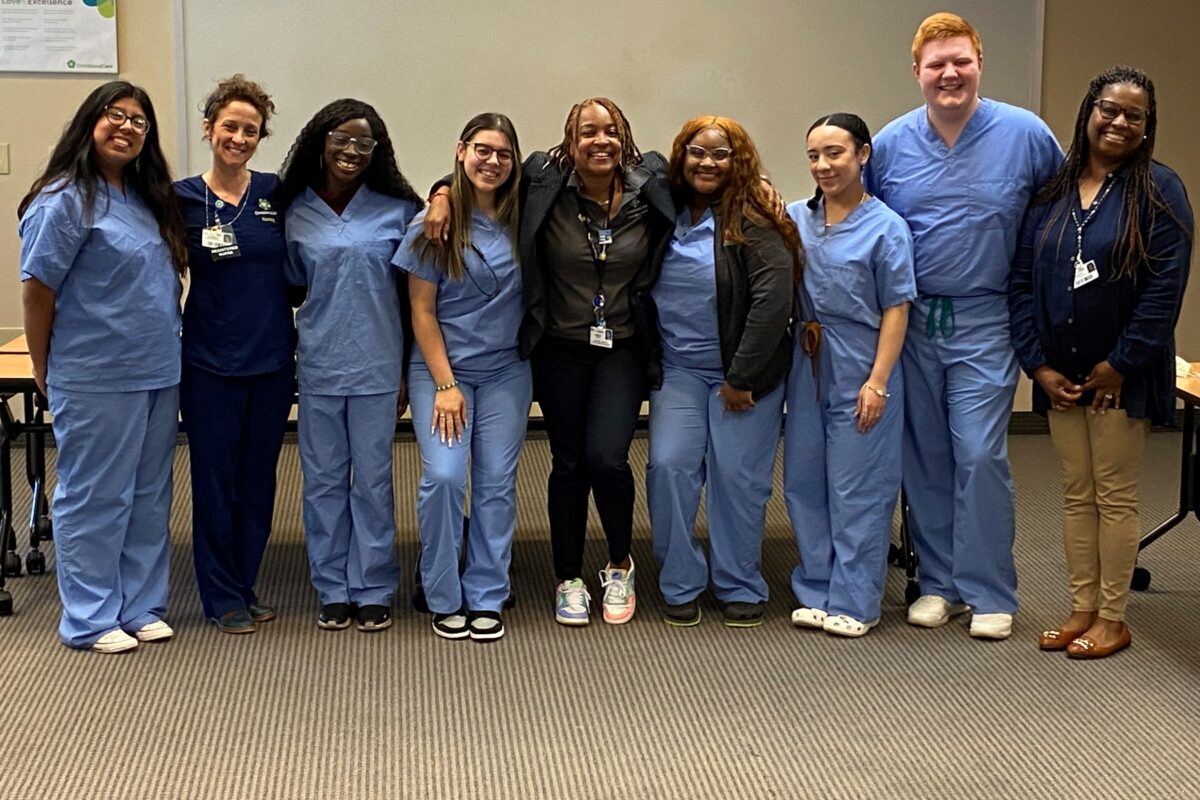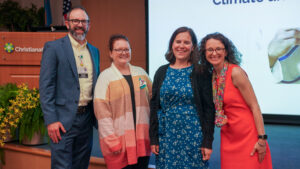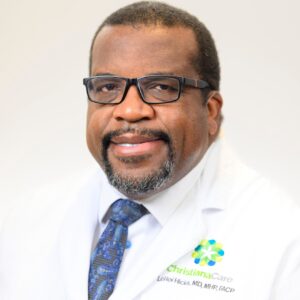Ever since she was a little kid, Yancey Hollis has given the same answer whenever someone asks her what kind of job she wants in the future.
“I’ve always wanted to be a nurse. I love how versatile it is. You can be bedside, administrative, in leadership – you can be anywhere and change people’s lives,” said Hollis, who recently graduated from William Penn High School in New Castle, Delaware.
“As I’ve gotten older, I realize I want to focus on labor and delivery so I can be an advocate for Black and Brown mothers.”
Hollis has a better idea about the scope of work nurses do and the amount of training required of them after her participation in ChristianaCare’s Nursing Career Collaborative, a partnership with William Penn’s Allied Health educational pathway to give students an in-depth look at what it means to be a nurse.
This year, 19 students participated in the program, which included classroom visits from ChristianaCare nurses, field trips to specialty and inpatient units at Christiana Hospital as well as the Emergency Department, and even one-on-one meetings with a recruiter to learn what to expect in a job interview.
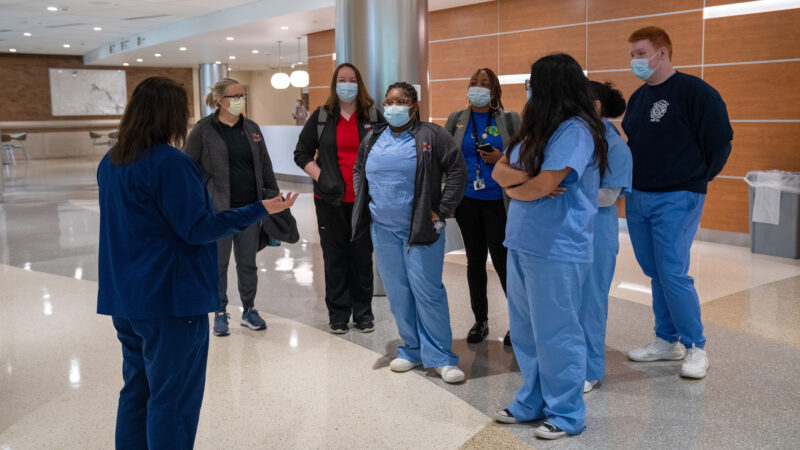
“These are some of our best kids. They know they want to work in health care and they’re eager to learn,” said Amy Slama, an allied health teacher at William Penn.
“Through the Nursing Career Collaborative our students have been able to see how nurses work with every area of the hospital. We’ve met a lot of amazing nurses and it has been incredible for them to get a hands-on view of the work they do.”
Building a workforce pipeline
Now in its second year, the Nursing Career Collaborative grew out of another successful ChristianaCare program, the Delaware Health Care Career Collaborative, focused on supporting high school students with an interest in becoming physicians, said Kamela Smith, MEd, manager of Community Education and Engagement at ChristianaCare.
The Nursing Career Collaborative aims to be another way to help grow the pipeline of skilled nurses in the region, particularly among students from populations that have traditionally been underrepresented in nursing.

More than 275,000 additional nurses are expected to be needed in the U.S. by 2030, because of retirements and increased patient needs, according to projections from the U.S. Bureau of Labor Statistics. Helping students recognize and build on their interest in health care is a critical way to help ease the shortage while also making sure the profession reflects the diversity of the patients they serve, Smith said.
According to the 2022 National Nursing Workforce survey, nurses from minority backgrounds represent 20% of the registered nurse workforce, and men make up 11%.
“Some of some of the scholars we work with don’t have exposure to nursing through their family or through their friends or their family’s connections,” Smith said.
“We know there’s a shortage of nurses nationally, and with the collaborative, we’re helping to address that now by giving these high school scholars the knowledge, understanding and exposure they need so they can be effective heath heroes in the future.”
Tapping into the future
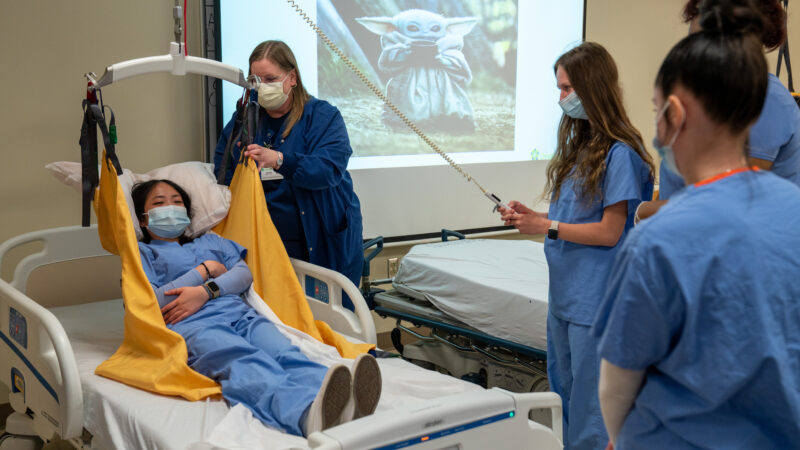
This year’s class of collaborative students included two groups: one for first-year students to learn about the history of nursing, opportunities for undergraduate study and career outlook, and an overview on legislative issues impacting nursing and care delivery. Second-year students took a deeper look at the different levels of nursing and some of the specialties available in the profession.
During a visit in May, first-year collaborative students headed to Christiana Hospital, where they learned about ChristianaCare’s award-winning comprehensive safe patient handling program, known as PEEPS. Students took turns lifting each other out of a hospital bed using an overhead harness. Second-year students toured ChristianaCare’s Center for Women’s & Children’s Health, where more than 6,100 babies are born each year.
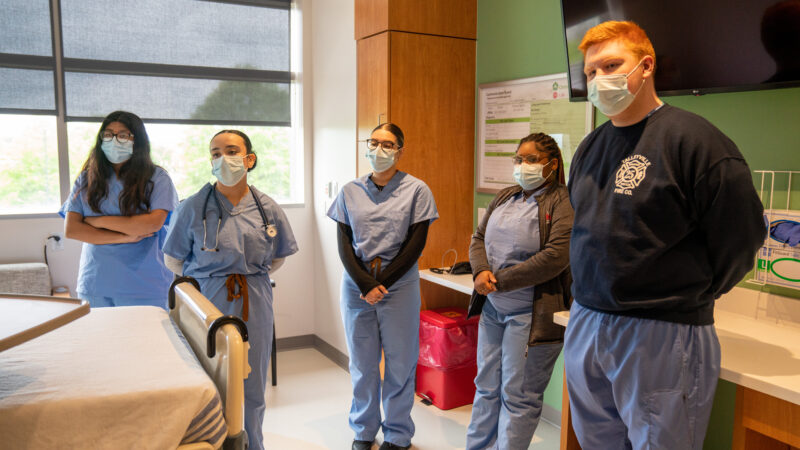
After seeing nurses caring for the tiniest patients in the Neonatal Intensive Care Unit, Hollis said she knows she is heading down the right professional path.
“It makes me excited to tap into a little of what my future will be like,” said Hollis, who is attending Delaware State University in the fall to study nursing.
Slama said William Penn students often get double takes from passersby when visiting Christiana Hospital in their blue scrubs. They appreciate the extra attention the unofficial uniform provides.
“When they put on the scrubs, I see a shift in the kids. They’re hungry for those experiences, to be physically present and learning,” Slama said.
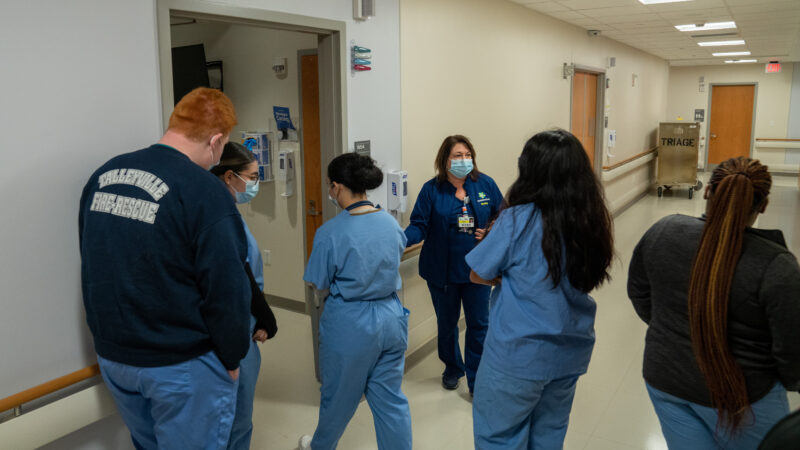
“This what makes it come alive for them, and it’s also creating this idea in the kids’ heads – ‘Hey this is something you can do.’”
Filling in the gaps
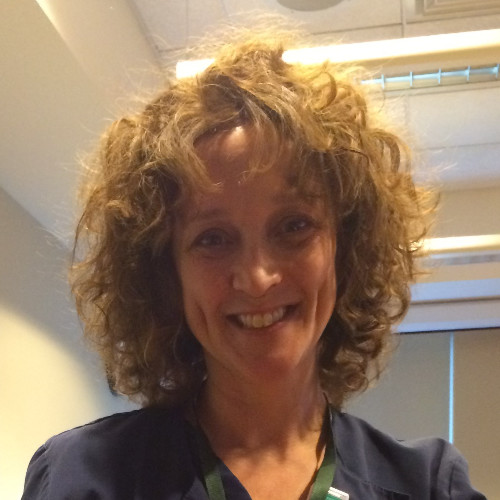
Barbara Feeny, MSN, NPD-BC, MEDSURG-BC, HN-BC, a nursing professional development manager with the Institute for Learning, Leadership & Development (iLEAD), partners with Smith and Moneca Davis-Graham, iLEAD coordinator, on the Nursing Career Collaborative.
Feeny said the earlier students can learn about nursing as a career pathway, the better. Students should have a realistic view of the academic rigor of nursing school and the classes they should be taking in high school to better prepare them.
In developing the Collaborative’s curriculum, her objective was to create a program that is educational, engaging and enjoyable. As an added bonus, Feeny, Smith and Davis-Graham also developed collegial bonds with the students that helped them further deepen their understanding of modern health care.
“By educating and exposing students to nursing, we hope to generate interest about the profession,” said Feeny, who also works with local colleges and universities to help more than 1,000 undergraduate students complete their clinical requirements at ChristianaCare.
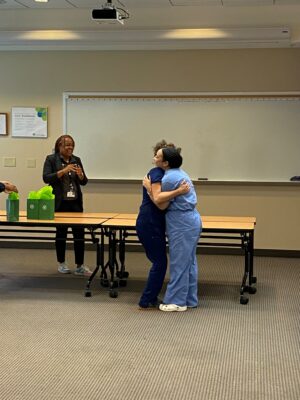
“When we have them in front of us and we’re talking with them, we can really see what they understand and help them with filling in any knowledge gaps they may have.”
As a volunteer emergency medical technician with his local fire department, Aaron McNett already has experience with the demands of patient care. But being a part of the Nursing Career Collaborative has helped him to zero in on what he likes best – emergency room nursing. He’s hoping to join the New Castle County paramedic program and get his nursing training through Delaware Technical Community College with a long-term goal of becoming a nurse practitioner. The recent William Penn graduate credits the Nursing Career Collaborative with getting him excited about health care.
“Being able to walk around the hospital and see the feelings of respect and appreciation there are for the nurses really made me feel good about what I want to do,” McNett said. “I do truly love helping people.”
That’s the goal of the Nursing Career Collaborative – helping students make that connection, professionally and personally.
“I want them to walk away saying, ‘Wow, I learned so much.’ I want them to get excited because part of our job is planting those seeds. And I feel like we’re really doing it with this program,” Smith said.
